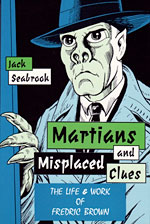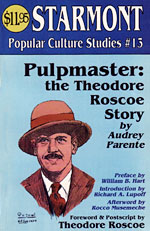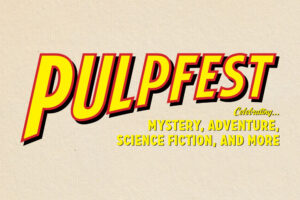
I had read a few short stories by Fredric Brown and enjoyed them fairly well. So I picked up a copy of Jack Seabrook’s biography of Martians and Misplaced Clues: The Life & Work of Fredric Brown. Seabrook mentions that details of Brown’s life are somewhat sketchy, then proceeds to demonstrate that for the next 262 pages.
The biographic parts of the book could be boiled down easily to an interesting article for The Pulpster or Blood ’n’ Thunder. Instead, Seabrook interspaces the biographic portions with thorough plot summaries of Brown’s stories and novels.
Be forewarned if you are interested in reading Martians and Misplaced Clues: There are plenty of story spoilers throughout it. To make matters worse, many of Brown’s short stories are quite Twilight Zone-like, ending in twists or surprises. Seabrook’s summaries often take the oomph out of reading any of Brown’s fiction.
Seabrook takes the easy road often used by reviewers. It’s so much simpler to just tell the plot of a book, a story or a movie, than it is to actually review it and explain what makes it interesting or not, good or bad, worthwhile or a waste-of-time. (That means taking a critical look at something; hence the term “critic.”)

Audrey Parente put in the extra effort in her biography, Pulpmaster: The Theodore Roscoe Story.
Parente traces Roscoe’s growth as a writer from being the grade-school author of “Red Roach Ranch” (the title provides for a humorous childhood anecdote), to college newspaper writer to pulpster and after. She goes beyond Roscoe’s self-description of “writing to eat” to show how his stories reflect more about him than he realized. And she does this by providing just the right amount of substance from Roscoe’s stories – just enough to pique your interest in reading them and not spoil them.
Parente, who had previously written Pulpman’s Odyssey: The Hugh B. Cave Story, discovered that Roscoe lived nearby on Florida’s east coast. That enabled her to sit down with him and his wife, as well as look through his papers.
Maybe that’s the rub between these two books. There wasn’t much information available about Brown, whereas Roscoe was in the neighborhood and had copious papers to pull from.
It was easier for Parente to write a book because the information was plentiful. Seabrook, on the other hand, had to fall back to padding the book with story summaries. Too bad. A bit of bloodhounding by Seabrook might have turned up a much more interesting biography.
If you have a choice and are looking for an interesting read, pick Parente’s Pulpmaster.
– William



Your comments